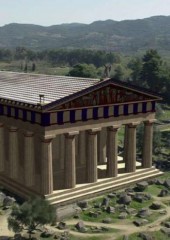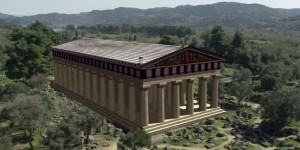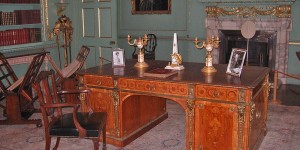- What is your job title?
I'm a Senior Archaeologist at Archaeology South-East, which is the commercial unit of University College London's Centre for Applied Archaeology (well, you did ask!). Our office is in Sussex, and as the name suggests most of our work is carried out in the south-east of England. I'm also an Associate Tutor in Archaeology at the University of Sussex, just for something to do in evenings and at week-ends... - What are you current projects, museum or personal?
Despite the economic downturn, I'm personally still pretty busy doing evaluations, watching briefs and excavations. I've also got a shamefully large back-log of sites to write up. I'm in the midst of setting up some Community Archaeology in a field down the road from my house too. - What first got you interested in Archaeology?
A combination of Michael Wood and my older brother and sister. I can remember being fascinated by his programmes on TV (Michael Wood, not my brother...). My siblings used to bury toy cars in the back garden of my parents house for some unknown reason, so I got used to the idea of digging up ancient rusty treasure from an early age. - How did you get into the Archaeology careers field and your current job?
When I graduated from York in 1992, the job situation was arguably even worse than it is today. I did the usual of sending my inexpert CV to various units but to no avail. It was actually a 'thank you' letter to a Project Manager at Archaeology South-East for helping me with my dissertation that kick-started it all. A couple of days later the phone rang and it was him asking if I wanted a couple of weeks of work. For the next 18 months I dug on and off for Archaeology South-East (often a day on-site followed by a couple of months on the dole). And then in 1994 I was offered a contract. I've been at the unit ever since, working my way up from humble excavator to even humbler site director. - What kinds of experiences have got you where you are today?
Not being frightened of a bit of hard work... and listening to advice. I was lucky with my training digs too: Dolforwyn Castle under Lawrence Butler, and Sutton Hoo under Martin Carver. Both interesting sites with inspiring directors. - What are some of the best parts of your job?
The concept of getting paid to do something as wonderful as archaeology, either in-the-field or as a tutor. I've never lost the sense of excitement of finding things, and I hope I never do. Walking out on an archaeological site in the morning still feels like a privilege to me. - And some of the worst?
Dealing with openly hostile developers (thankfully a rare experience). Getting up far-too-early and scrapping ice off the car to drive to an inhospitable site and move mud from one place to another is never that great either. But I think the good bits massively outweigh the bad bits to be honest. - How much do you have to deal with members of the public?
Regularly. People are generally interested if you're digging a hole in a plot on their local High Street. Once we've got past the inevitable questions about Time Team, you can quite often have a good chat. And there's always the chance of tea and biscuits appearing if they live nearby! I'm also the unit's Widening Participation Officer so I get to encourage a range of people to come and take an active part where possible. - What are your thoughts on the state of the archaeology field in this country? Do you think it's adequate, is there any room for improvement and if so where?
Clearly the economic downturn is having a serious affect on the commercial units. Basically if there's little or no new building work, there will be dramatically fewer PPG16-triggered archaeological projects. Before the current crisis, poor wages were the usual talking point: they have always have been low compared to other industries. But if you want good wages and a secure job, go and work in a bank. Oh, hang on... - How do you see the current Archaeological climate in terms of jobs in this country?
Bad, and there's no point pretending otherwise. However, there are a few digging jobs out there, you just have to look a bit more carefully for them these days. And it will get better in time, and then we'll return to the situation of a couple of years ago, when there were actually too few skilled archaeologists to fill all the available job vacancies. - What advice do you have for students wishing to get a job in Archaeology?
Join the Institute for Archaeologists (until recently the Institute for Field Archaeologists). There's a student grade. This just shows a genuine interest, and they publish an excellent weekly job sheet. Look at web-sites like BAJR. But arguably your best bet is to get in touch with the local unit wherever you're going to be living and ask to be put on their database of potential diggers. And do as much digging as you can (sounds obvious, but I know of people with an MA in Field Archaeology who barely know one end of a trowel from the other). But most important of all, learn to drive and try and get a car: you're potentially far more use if you can get to the site under your own steam. - What are your experiences of job interviews?
I haven't had one for years. I got offered both the archaeological jobs I applied for back then, so I must have done something right. - Do you have any interview technique tips?
Just be honest, and on time. And make sure your CV looks good and doesn't have any silly mistakes in it. Hopefully a CV bulging with relevant experience will make any interview a mere formality.
With thanks to Simon Stevens, UCL






